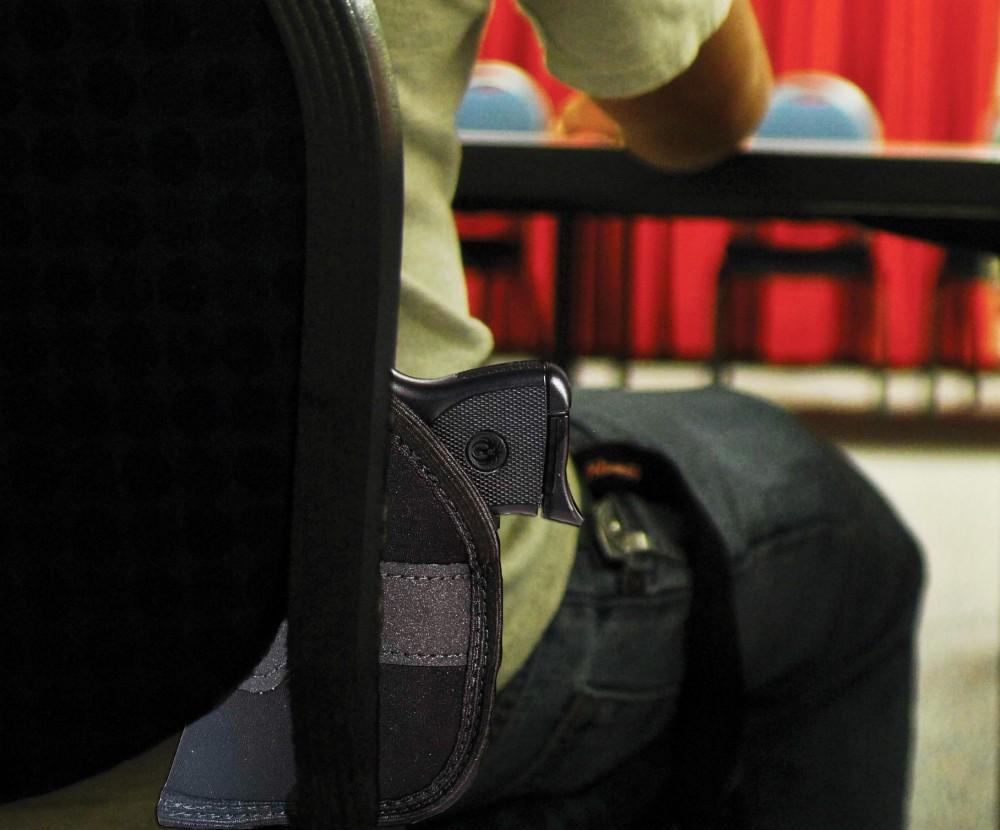Students protest for concealed carry on campus

Students for Concealed Carry on Campus plan to hold an empty holster protest next week to raise awareness of students’ Second Amendment rights.
Apr 1, 2010
A gun can mean a lot of things. For some, it can mean a sport, a tool, a protector, a weapon. For the members of Students for Concealed Carry on Campus, a gun is a right.
“The way I see it the Second Amendment is the most important right an individual has,” said Justin Tomei, president of the College Republicans. “The Second Amendment is there to protect the others, and that is what I want people to learn. As far as SCCC is concerned I just feel law-abiding citizens should have the right to defend themselves even on college campuses. I would rather have a weapon and not need it, then need it and not have it.”
The SCCC has spent the last week tabling in the Kirkhof Center, promoting the idea of concealed carry on Grand Valley State University’s campuses.
For Monday through Friday, SCCC has planned an Empty Holster Protest on campus. Students will carry empty holsters on their waist line to signify where a concealed carry would go provided a law was passed allowing it. More information on participation rules can be found by e-mailing SCCC campus leader Brian Tucker at [email protected]
“The reason we decided to host our table this past week was to begin the discussion about SCCC so more students understand the debate and are able to form rational opinions one way or the other,” Tomei said. “Since guns are so commonly misunderstood we felt education was necessary. The empty holster protest has been deemed legal in the courts and I encourage more people to learn about it during the time it will be taking place.”
Tucker, who spoke on behalf of the entire SCCC group, said the hardest obstacle to overcome is the common misconceptions people have about gun usage such as what he said is the largely-accepted idea that SCCC advocates all students carrying a firearm.
“This is horribly far from the truth,” Tucker said. “We only wish that adults 21 and up that are already legally licensed to carry as per the state regulations may do so on campus as they do anywhere else, i.e. banks, grocery stores, shopping malls, theaters, etc.”
Tomei said the most common misconception he has heard throughout the project has been that “more guns equal more violence.” He thinks it is exactly the opposite.
“The most effective way to curb violence would be armed citizens,” Tomei said. “Would a criminal attack someone who he knows isn’t armed or someone who is armed? It is a simple concept. Gun-free zones kill people.”
In the wake of university shootings such as Virginia Tech, students from the SCCC argue that if there were no gun restrictions, the licensed students on campus with concealed weapons would have had the opportunity to disarm and stop the perpetrator.
Frank Hughes, director of the School of Criminal Justice, disagreed.
Weighing in the with a doctorate in criminal justice and 25 years as a police officer, Hughes said he does not think the environment of a college campus is well suited for concealed weapons.
Hughes said students with concealed weapons on campus have the potential to put a police officer in a dangerous position when they have more than one student with a gun.
“It comes down to lack of experience,” he said. “Without experience, judgment is hindered on the part of people – I don’t think people in that position will always necessarily have good judgment.”
Regardless of any threat level, SCCC said reasonable safety precautions are in order.
“I believe that any threat should warrant reasonable precautions, and concealed carry has been proven on college campuses to be a safe form of self defense,” Tucker said. “As in the State of Utah where students may carry concealed (weapons) on campus, there has been no criminal offense committed by (Concealed Pistol License) holders. We are not vigilantes, and we do not look for a reason to use a firearm, it is in fact our last resort should all other options become exhausted.”
SCCC officer James Gallagher thinks concealed carry is an important facet of our rights as Americans.
“All I ask for is what anyone would ask for any other day; If I’m going to be put in a situation where death is a possibility, let me fight,” Gallagher said. “I’m not going down without trying to save mine and potentially others lives. It’s a very simple concept; I value my life and any restriction to let me do so violates a natural, God-given right; the right to live.”
Hughes, however, is still not certain that this is enough.
“I would be totally against removing those restrictions,” Hughes said. “I do not feel the training received by an individual is enough. I don’t think the appropriate response is to arm students on campus.”

























